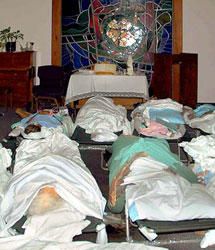Just Read It...

Faith-based disaster
David L. Kirp
Link Here
Monday, September 19, 2005
That the Federal Emergency Management Agency mismanaged the Hurricane Katrina relief effort is old news. But there's more to FEMA's failure than simple bungling. The Bush administration's core belief that faith-based organizations can do the job better than the government or experienced nonprofits has compounded the problem.
Immediately after the hurricane, there were only two secular organizations to which FEMA's Web site urged that contributions be made; all the others were faith-based. What's worse, in at least some instances, FEMA relied on faith-based charities to spearhead the emergency-relief effort, regardless of whether they had expertise. Case in point: Tulsa, Okla.
Years before Katrina, a coalition of public agencies and nonprofit groups in Tulsa, led by the Red Cross, had devised a disaster plan. In the wake of Katrina, the coalition quickly developed a detailed strategy to aid the survivors who, it was anticipated, would be sent to Tulsa -- to provide help not just in the immediate aftermath but for the days and weeks ahead.
An estimated 1,500 to 2,000 hurricane survivors were indeed bused from New Orleans via Houston to Camp Gruber, a nearby National Guard facility. But in deciding which Tulsa agency to turn to, FEMA chose Catholic Charities -- which wasn't part of the coalition, had no relevant experience with long-term placement of disaster victims and whose mission is "bringing Christ's merciful love to people who suffer in our midst."
FEMA was so intent on relying on a faith-based group that it neglected to look at the state map: it initially contacted Catholic Charities in Oklahoma City, 123 miles away from where the storm victims were being housed. FEMA also shipped hurricane survivors to a youth camp for Southern Baptists in a remote corner of the state, a site described by the faithful as "the most prayed place." Meanwhile in Tulsa, because Catholic Charities lacked the necessary personnel for the assignment, local fire departments were enlisted to help in doing the job. While firefighters are trained to do many things, they don't know how to help victims of natural disaster start a new life.
This lack of expertise made the resulting failures entirely predictable. Because the wrong organization was placed in charge, there was no effective long-term plan for the survivors. Consequently, no one knows for sure how many people were brought to Camp Gruber or where they've gone to. Check out the Tulsa Catholic Charities' Web site and you'll read instead about the bishop's visit and the "active pastoral presence" at the camp.
It makes sense, in the wake of a cataclysm like Hurricane Katrina, for the government to mobilize nonprofits as part of the response. Using religion as a litmus test to decide who will provide relief is not only wrong, it's a surefire prescription for disaster.
David L. Kirp is professor of public policy at the University of California at Berkeley.




0 Comments:
Post a Comment
<< Home